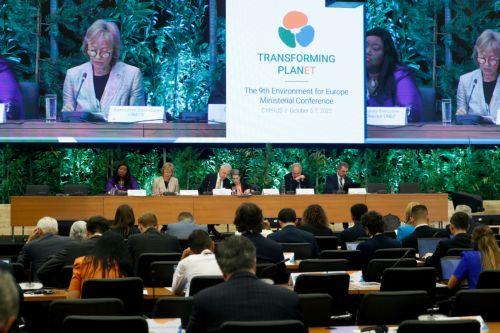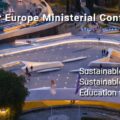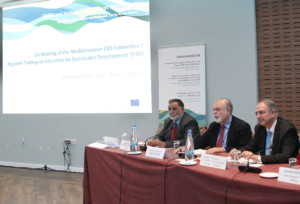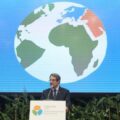(Report by Thalia Neophytou of Cyprus News Agency)
The third High-Level Meeting of Education and Environment Ministries held within the framework of the work of the United Nations Economic Commission for Europe (UNECE) 9th Ministerial Conference, adopted Wednesday the Nicosia Ministerial Statement on Education for Sustainable Development
At the same time, the Ministers of Education and Environment who participated in the Summit approved the new framework for the implementation of the UNECE Strategy for ESD from 2021 to 2030.
In his welcome message at the High-Level Meeting the Minister of Education, Sport and Youth Prodromos Prodromou, stressed that education, can be a fundamental tool to behavioral change and for promoting new appropriate attitudes, often described as an Environmental Citizenship.
As he said “the session is about the vision, decisions and actions on Education for Sustainable Development that will lead and guide the UNECE Region Member States toward 2030”. The Minister referred to a very ambitious plan, which is aligned with the major initiatives on ESD on a regional, Mediterranean, European and global level.
“We proceed towards this plan fully aware of the current “momentum of change and crisis”. In a rapidly changing world, with considerable political and socioeconomic developments, at national and global level, the new implementation framework for UNECE Strategy on ESD 2030 can respond to many known and new challenges”, he said.
He also said that Cyprus has the honor to chair, since 2017, the UNECE ESD Steering Committee, a very powerful and effective Committee inspired by knowledge, expertise and capacity building, leading to innovations and good practices on ESD for sustainable development communities.
“The answer to the question whether education can serve to achieve a more sustainable, just and healthy world, is undoubtedly positive. But we have to elaborate on the transitions needed to reach that and specify who will lead the way.”, the Minister went on to say.
Minister of Agriculture, Rural Development and Environment, Costas Kadis said that “we are facing the triple planetary crisis of climate change, biodiversity loss and pollution that puts the current and the future generations in risk”.
“It is our duty to take decisions that will safeguard the well-being of the future generations, but it is also our duty to educate young people, who are the future leaders, to respect the planetary boundaries and protect the environment. This is the only way for humanity to continue develop and thrive on the planet”, said Kadis.
He added that education is key for achieving sustainable development. As he said, during this economic, environmental, climatic and social crisis era, in which the education systems have been so severely hit, “we need to get back on track towards achieving the Sustainable Development Goals”.
In her introductory remarks UNECE Executive Secretary Olga Algayerova said called on member states to seize this opportunity to strengthen global and regional cooperation at all levels, while calling on states to mobilize sufficient financial and human resources in the direction of sustainable education.
The Deputy Executive Director of the United Nations Environment Programme, Sonja Leighton-Kone pointed out that sustainability is not a matter of choice, but a matter of survival for millions of people around the world.
Assistant Director-General for Education of the United Nations, Educational, Scientific and Cultural Organization, Stefania Giannini emphasized the importance of connecting the dots between economics and environmental policy. She also said that UNESCO considers it necessary to include the topic of sustainable education in the curricula. By taking a holistic approach, she added, we can implement a program with measurable results to change the mindsets of young people.
Chair of the UNECE Steering Committee on Education for Sustainable Development. Aravella Zachariou, presented the key findings of the report on the progress of the implementation of the UNECE Strategy for Education for Sustainable Development, and a brief outline of the next framework for the implementation of the UNECE Strategy for ESD from 2021-2030.
Ministers of Education from Cyprus, Slovenia, Armenia, Romania, Palestine and the Netherlands, as well as NGO representatives, spoke with brief interventions on their policies for environmental education in their countries.
In panel discussions held during the High Level Meeting, the Ministers pointed out their commitment to the main pillars of the framework for Education for Sustainable Development, while there were presentations from experts, technocrats and non-governmental organizations. The panels concerned four policy areas: quality education, a whole institution approach, digital education as well as entrepreneurship, employment and innovation. Ministers from Andorra, Georgia, San Marino, Cyprus, Hungary, Greece and Serbia participated at the panels, while there were interventions from technocrats, experts, and NGOs.
The Meeting closed with a video with environmental messages that children from the Pernera Primary School in Nicosia presented.



